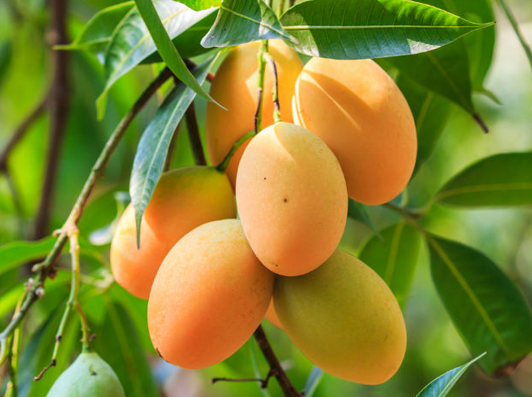When summer comes to knocks the door, nature offers its sweetest treasure – the mango. Often crowned as the Mango: “King of Fruits”, mangoes are more than just a juicy, delicious indulgence. Packed with essential nutrients and health-boosting properties, this tropical gem is a delight for both the palate and the body. Let’s explore why mango deserves its royal status and how you can enjoy it the right way. How we can include the mangoes in our diet?

Mango Fruit is a tasty fruit that grows in warm places. It is sweet and perfect for you. It has many vitamins, minerals, and antioxidants that can help improve your health.
Mango The King of Fruits in India. But Why?
The Amrafal is known as the king of fruits. This name comes from its great taste, pungent smell, and many health benefits. Many cultures see mangoes as a sign of wealth and plenty. This belief adds to their status as the king of fruits.
Mango holds a regal place in the world of fruits due to its:
- Rich Flavor Profile: Sweet, tangy, and sometimes a little spicy – every variety of mango has a unique taste.
- Nutritional Goodness: It’s loaded with vitamins, antioxidants, and fiber.
- Cultural Importance: From ancient Ayurvedic texts to modern-day culinary delights, mango is revered in many cultures.
Nutritional value of Mango per 100g

- Calcium: 10 g
- Protein: 0.51 g
- Total fat: 0.27 g
- Dietary fiber: 1.8 g
- Carbohydrates: 17g
- Calories: 65 Kcal
Health Benefits of Eating Mango
1. Rich Source of Vitamins & Minerals
Mango is an excellent source of Vitamin C, which boosts immunity and promotes healthy skin. It also provides Vitamin A for eye health and Vitamin E for skin and cell protection.
2. Mango is Best for Digestion
Mango contains enzymes like amylases that help break down complex carbohydrates. Its fiber content also aids smooth bowel movements and prevents constipation.
3. Boosts Immunity Power
The combination of Vitamin C, A, and E, along with antioxidants like beta-carotene, helps strengthen the immune system and keeps infections at bay.
4. Good for Brain Health
Mango is a source of Vitamin B6, which plays a role in brain development and function. Regular consumption may support better mood and concentration.
5. Enhances Eye Health & Power
With its high lutein and zeaxanthin content, mango protects the eyes from harmful blue light and may reduce the risk of age-related macular degeneration.
6. Mango Fights Free Radicals
Mangoes are rich in polyphenols and antioxidants, which fight oxidative stress and reduce the risk of chronic diseases like cancer and heart disease.
Cholesterol Control Mango Fruit is Super Hero
- Mangoes can help lower cholesterol. Using them regularly can give good results.
- They contain antioxidants such as quercetin and Mangi ferine.
- These antioxidants combat harmful free radicals that can block your arteries.
- Additionally, the fiber in mangoes helps to clear cholesterol from your blood vessels.
- C Vitamin helps increase good cholesterol. Mangoes may not be a magic solution, but they can really help your cholesterol levels!
- They are also rich in potassium, which is essential for keeping your blood pressure in check.
- One of the primary reasons the mango is crowned King of Fruits is its delightful ability to tantalize the taste buds with its sweetness and unique flavor profile.
- Beyond mere pleasure, this rich fruit boasts high amounts of potassium and fiber, contributing to overall health and aiding digestion.
Right Way To Eat The Mangoes
Mango is a very Delicious, Sweet & Beautiful Fruit . here are a few healthy and creative ways to enjoy it:
🍴 1. Eat It Fresh & Raw
Simply peel and slice it. Fresh mango chunks are the purest way to enjoy the fruit. It’s perfect as a snack or a dessert.
🥗 2. Add to Salads
Mix mango cubes with cucumber, mint, and lime for a refreshing tropical salad. You can also pair it with avocado and greens for a nutritious twist.
🍶 3. Blend into Smoothies
Mango, yogurt, and a splash of almond milk make a creamy and energizing smoothie – perfect for breakfast or post-workout.
🍚 4. Top Your Oatmeal or Cereal
Add mango slices to your morning oats or muesli to give it a natural sweetness without needing extra sugar.
🍨 5. Make a Healthy Mango Dessert
Freeze mango puree in molds for homemade mango popsicles. You can also make a dairy-free mango mousse using coconut cream.
While Eating Mango Follow Some Pro Tips:

- Best time to eat: Mornings or early afternoons. Avoid eating mango late at night to prevent digestive issues.
- Avoid mixing with milk: Though mango milkshakes are popular, Ayurveda suggests avoiding this combo as it may create digestive imbalance in some individuals.
- Soak before eating: Soaking mangoes in water for 30 minutes helps reduce their heat and may prevent acne or heat-related issues.
Conclusion:-
Mangoes are amazing fruits known as the “King of Fruits.” They have a wonderful taste, are packed with nutrients, and can be used in many ways. People around the world love mangoes. Mangoes are high in powerful antioxidants, so they are a good choice for health.
These can help fight free radicals in the body, possibly preventing heart disease and slowing ageing and cancer.
Mangoes offer a host of health benefits. They are highly nutritious and have lots of potassium and magnesium. This makes them an excellent remedy for high blood pressure and reduces the risk of heart disease.
